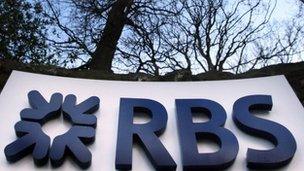RBS has sacked four traders over the Libor-fixing scandal
- Published

RBS is one of many banks under investigation for alleged fixing of the key Libor bank rate
The Royal Bank of Scotland has sacked four traders over their alleged involvement in the Libor-fixing scandal, it has emerged.
BBC business editor Robert Peston says the dismissals happened at the end of last year.
RBS is one of a number of banks being investigated for possible rigging of the key bank lending rate.
The news comes days after Barclays became the first bank to be fined for false reporting of it.
Barclays was fined £290m ($450m) after the Financial Services Authority (FSA) found its traders had lied about the interest rate other banks were charging it for loans.
Giving a lower reading than the true rate would give the impression other banks thought it was a better risk to lend to than it was.
Libor (London Inter Bank Offered Rate) is the rate at which banks in London lend money to each other.
On Friday, RBS chief executive Stephen Hester confirmed that his bank was one of a number of banks being investigated over attempts to manipulate Libor interest rates.
He also announced he had decided not to take a bonus for this year.
'Emotion'
The decision followed the chaos caused by an update to RBS computer systems which left many customers unable to access their accounts or move money.
Mr Hester told the BBC it was a time of "high emotion around financial services".
Earlier, the head of the Financial Services Authority, Lord Turner, said the FSA's fine for Barclays was its strongest currently available sanction and the law should be tightened to tackle misbehaviour in banking.
He told the BBC's Andrew Marr programme there should be a presumption a director of a failed bank should not work in the industry again.
Conservative MP Mark Garnier, who is a member of the Treasury select committee and a former fund manager in the City, told the BBC the current laws needed to be re-examined.
He said: "What troubles me about the legislation that is in place at the moment is that the FSA can't bring any criminal sanctions against the people who perpetrated these wrongdoings with regards the Libor fixing and this is a big sort of hole if you like in the legislation which, I think, needs to be resolved."
Business Secretary Vince Cable is considering criminal sanctions for bank directors.
Mr Cable said those in charge of failed banks should face prosecution, a view echoed by Lord Turner.
The business secretary said the government would launch a consultation on the matter later this week.
Not confident
A survey by the consumer group Which? found popular support among those canvassed for a toughening of the law on malpractice among bankers.
It found more than three-quarters of people (78%) who responded thought individuals should be personally prosecuted when banks broke the law.
It also showed two-thirds (66%) were not confident the government would act in their best interests when introducing banking reforms.
Lord Turner said the FSA had been in talks with the Serious Fraud Office (SFO) and that, if there had been fraud, the latter could bring a case against those implicated.
Ministers have announced an independent review of the Libor workings, which will be established next week and report by the end of summer.
Our correspondent said he understood it would be three months before RBS reached a settlement with the FSA and other authorities over its role in the scandal.
The amount of fine and penalties it would have to pay had not yet been agreed, he added.